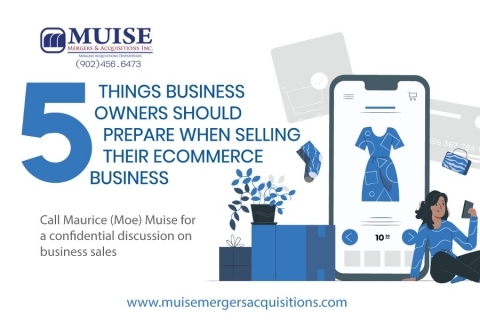5 Things Business Owners Should Prepare When Selling Their ECommerce Business

Selling an eCommerce company is not the same as selling a conventional brick-and-mortar firm. In some instances, marketing an online shop is much easier, but there are additional obstacles. If you want to sell your company, there are numerous factors to consider to maximize the closing value. In this article, we will go through the top five things you should know as a business owner to maximize the price you earn when selling your company.
1. Clean Financials
Take the time to ensure that your financial statements are accurate and in good standing to ensure that your company sells quickly and efficiently. It will show to any potential customers that your company is dependable and trustworthy. Buyers want to see reports and statistics like the number of new and returning customers, a long history of steady and transparent growth, upward revenue sales patterns, records of reputable suppliers and backup suppliers, and a clean legal history of predicting an optimistic future trajectory.
Any company needs to maintain meticulous financial records. You risk losing the sale if your financial reports are disorganized, combined with another company, or non-existent. If you are unable to account for sales and expenditures properly, a buyer is more likely to walk away from your company's sale. Many third-party firms provide audits, which are a perfect way to detect potential indiscretions if you're confused or need assistance. Getting good financials typically translates to a higher revenue multiple and a higher business valuation.
2. Staff Contracts
Buyers would want a clear record of the employment contracts they agree to sign. It would boost your company's success if you can include comprehensive and up-to-date versions of employee contracts. If you're dealing with foreign customers and business models, this is especially important. In the United States, there are no specific laws on the transfer of employees and their contracts; however, the United Kingdom and other European countries have strict regulations to protect workers' rights. The TUPE (Transfer of Undertakings Protection of Employment) legislation protects work that has occurred outsourced or subcontracted and workers. Before attempting to sell your business, familiarize yourself with TUPE, in the event that the sale of your business will be affected by this law.
3. Supplier Contracts
Along with employee contracts, it's essential to keep a clear list of vendors and ongoing agreements. Since its sale impacts a business's legal status and reputation, all commitments and contracts need to be updated accordingly. Although it is simple to pass the company's rights and benefits, the responsibilities often remain with the current company. Each following step should be taken to resolve any outstanding commitments from previous contracts:
- Quality is operating subcontracted to a news organization. To make this decision, you'll need transparent, detailed, and checked copies of the initial contracts.
- Agreements on novation to ensure a seamless transition of supplier contracts, all three parties must sign them.
- Letter of notice Both contractors receive these letters informing them of the company sale and allowing them to terminate the contract if they are unhappy with the situation. By doing so, you will absolve yourself of all blame for any potential issues that might occur.
4. Systems
Make a comprehensive how-to guide (standard operating procedure) for your buyer to ensure that they are prepared to take over the reins of your business. If you already have straightforward processes that are easy to communicate to the customer, everything should go smoothly. Try to provide a simple manual for the buyer to refer to the plan for this move. During this phase of learning, ensure that communication is accessible and equal.
5. Business Valuation
When looking to sell your firm, your company's annual income and the revenue multiple allocated to your company by the buyer are critical. Your company's profit is measured by how much money you've earned after you've paid for your running expenses, just as it is in more conventional business models.
The customer determines the sales multiple. It's a ratio that describes how much of your profit a customer is willing to pay to purchase your entire e-commerce business. The sales multiple is defined by the buyer's perception of investing in your company: the lower the risk, the higher the sales. And being able to present an accurate and complete business valuation is critical for a successful sale, as it will boost your reputation and allow potential new buyers to put their trust in you.
Conclusion
The ability to account for financial and related documents, as well as contracts, processes, and business valuation, will reduce the perceived risk of the buyer's investment and place the company on the road to a profitable sale.



